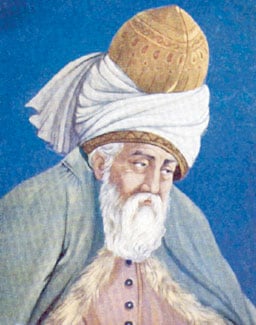Why is Rumi called Rumi?
 Can you think of a word that radiates warmth and insight at the same time? You guessed it, thanks to the title of the article: Rumi.
Can you think of a word that radiates warmth and insight at the same time? You guessed it, thanks to the title of the article: Rumi.
Best-selling poet in the USA, Rumi had his own way of observing the world around him and molding his observations into verse with mesmerizing beauty, unique and unparalleled. By using some onomastics, we shall see how this remarkable poet, who has become the symbol of Sufism for some, got his name.
A 13th-century religious scholar turned mystic poet, Rumi lived in Konya (present day Turkey). His given name was Jalal ud Din but he was commonly referred to as Maulana Rumi. Why so? Because it was a tradition to call religious scholars as “our lord” (Arabic: maula = lord, na = our) back then and hence the “Maulana”. As for the “Rumi” part, it is a typonymic name, which means a name derived from the name of a geographical area. Just like Leonardo da Vinci; he was born in the town of Vinci in Tuscany (Italy), hence the name. Take a guess. What place should Rumi be related to considering Medieval Europe? The correct answer is: Rome. In fact, the word “Rumi” literally means “from Rome” or, more precisely, “Roman”.
But, wait! We are talking about a person who lived in Turkey. Then why “Roman”? And if, by any chance, Rumi was a Roman, then I hear you ask why did he write in Persian and not in Latin? Let’s have a look at his history. He was born in Balkh (present day Afghanistan) in 1207. Those were the times of turmoil in Afghanistan – in all of Central and South Asia for that matter. The Mongol armies were advancing and people, in an effort to flee from the wrath of Genghis Khan, were heading west. Jalal ud Din’s family was also forced to leave their city when he was still young. They travelled west for years and finally settled in Konya (present day Turkey). So, even though Rumi was raised in Konya, his mother-tongue was Persian, since Balkh was part of the Persian Empire at the time of his birth.
The interesting part has just begun. With the fall of the Roman Empire in fifth century A.D, the Roman supremacy over Europe had come to an end. But, there was still one part of the Roman Empire that seemed to deny this belief, and continued to thrive on its own. With their capital in Constantinople (present day Istanbul) these were the eastern, mainly Greek-speaking parts of the Roman Empire which comprised of present day Greece, Turkey, Syria, Jordan, Lebanon, Levant and parts of Egypt and Libya. We now call it the Byzantine Empire.
When the Muslims began their conquests in the late seventh century A.D, they defeated the Byzantines to take over the northern Arab, and by the 11th Century, expanded their empire into the heart of the Byzantine Empire – Turkey. While, the official seize of Constantinople took place in the 16th Century, the Muslims were well into Turkey much before that, having captured the city of Konya in 1084 A.D. Since the Byzantine Empire was in a sense a continuation of the Roman Empire, Arabic name for Anatolia was ar-Rum, and the empire the Muslims established in the captured parts of Anatolia was named the Sultanate of Rum. And anyone who lived in the Sultanate of Rum automatically became Roman, whether they liked it or not. Therefore, Rumi might not be Roman by our standards, but he was according to the definition of Rome in those times.
Konya was an important point on the Silk Road and truly the meeting point of many cultures. Persian was slowly taking over Greek, its traditional language for centuries. So, for a poet who wrote Persian verses, Konya was, in fact, the ideal place to be. In short, Rumi was called Rumi because Rome used to be a big place back then. And he settles the dispute by calling himself the lord of Rome.
Maulvi hargiz na shud maula e Rum
Ta ghulam e Shams Tabrizi na shud
Maulvi could never have become the lord of Rome
Had he not devoted himself to Shams of Tabriz